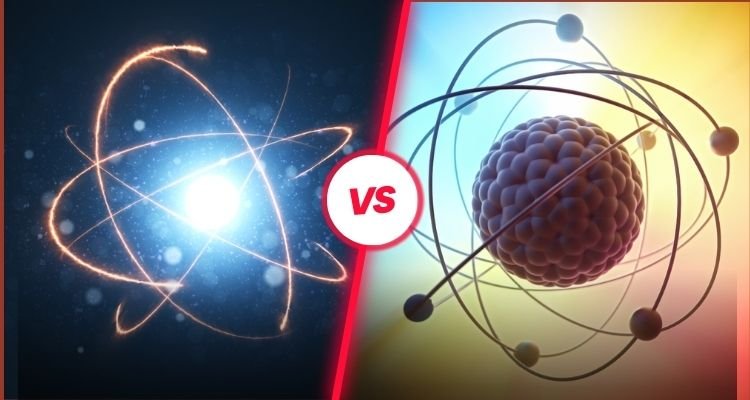Protons and neutrons are two of the most fundamental particles found in the nucleus of an atom. While they share some similarities, they also have key differences that play a crucial role in the structure and behavior of atoms. Understanding these differences is essential for anyone studying chemistry or physics.
Definition of Protons
Protons are positively charged subatomic particles found in the nucleus of an atom. The number of protons in an atom’s nucleus is known as the atomic number, which determines the element’s identity. For example, an atom with one proton is hydrogen, while an atom with six protons is carbon. The positive charge of protons contributes to the overall electrical charge of the atom.
Key characteristics of protons include:
- Charge: Positive (+1).
- Mass: Approximately 1 atomic mass unit (amu), slightly less than that of a neutron.
- Location: Found in the nucleus of an atom.
- Role: Determines the element’s identity and contributes to the atom’s overall positive charge.
Definition of Neutrons
Neutrons are neutral subatomic particles, meaning they carry no electrical charge. Like protons, neutrons are found in the nucleus of an atom and have a similar mass. Neutrons play a crucial role in stabilizing the nucleus, especially in atoms with multiple protons. The number of neutrons can vary within atoms of the same element, leading to the formation of isotopes.
Key characteristics of neutrons include:
- Charge: Neutral (0).
- Mass: Approximately 1 atomic mass unit (amu), slightly more than that of a proton.
- Location: Found in the nucleus of an atom.
- Role: Contributes to the mass of the atom and plays a key role in nuclear stability.
Core Differences
Charge
- Protons: Have a positive electrical charge (+1).
- Neutrons: Have no electrical charge (neutral).
Function
- Protons: Determine the atomic number and the identity of the element.
- Neutrons: Help stabilize the nucleus and contribute to the formation of isotopes.
Mass
- Protons: Slightly less massive than neutrons, but both are close to 1 atomic mass unit.
- Neutrons: Slightly more massive than protons, also close to 1 atomic mass unit.
Presence in Isotopes
- Protons: The number of protons remains constant for all atoms of an element.
- Neutrons: The number of neutrons can vary, leading to different isotopes of the same element.
Core Similarities
Location
- Both protons and neutrons are located in the nucleus of an atom.
Mass
- Both particles have nearly the same mass, approximately 1 atomic mass unit.
Role in Atomic Structure
- Both protons and neutrons contribute to the mass of the atom and play essential roles in the stability and characteristics of the nucleus.
Comparison Table
| Feature | Protons | Neutrons |
|---|---|---|
| Charge | Positive (+1) | Neutral (0) |
| Mass | ~1 amu | ~1 amu (slightly more than proton) |
| Location | Nucleus | Nucleus |
| Role | Determines element identity, contributes to charge | Contributes to mass and stability, leads to isotopes |
| Isotope Variation | Constant across isotopes | Varies across isotopes |
Pros and Cons
Pros of Protons
- Identifies Elements: The number of protons defines the element, making it essential for categorizing atoms.
- Positive Charge: Balances the negative charge of electrons, maintaining electrical neutrality in atoms.
Cons of Protons
- Repulsion: Multiple protons in a nucleus repel each other due to their positive charge, which can destabilize the nucleus without neutrons.
Pros of Neutrons
- Stabilizes Nucleus: Neutralizes the repulsion between protons, making the nucleus more stable.
- Isotope Formation: Allows for the existence of isotopes, providing variability in atomic mass.
Cons of Neutrons
- Radioactive Decay: An imbalance in the number of neutrons can lead to radioactive decay, making the atom unstable.
Use Cases and Scenarios
- Identifying Elements: Protons are crucial in identifying and classifying elements on the periodic table.
- Nuclear Stability: Neutrons are essential for the stability of the nucleus, especially in heavier elements where more neutrons are needed to counteract the repulsion between protons.
- Isotopes: Variations in the number of neutrons lead to isotopes, which have applications in fields like medicine (radioisotopes) and archaeology (carbon dating).
Summary
In summary, protons and neutrons are both vital components of an atom’s nucleus, but they serve different roles. Protons have a positive charge and determine the identity of the element, while neutrons are neutral and contribute to the stability of the nucleus. The balance between protons and neutrons is essential for the structure and stability of atoms, and variations in this balance lead to the formation of isotopes.
FAQs
What is the main difference between protons and neutrons?
The main difference is that protons have a positive charge, while neutrons are neutral. Protons determine the element’s identity, while neutrons contribute to the stability of the nucleus.
Do protons and neutrons have the same mass?
Protons and neutrons have nearly the same mass, but neutrons are slightly more massive than protons.
Can the number of protons in an atom change?
No, the number of protons in an atom is constant for a given element and defines the element itself. Changing the number of protons would change the element.
What role do neutrons play in an atom?
Neutrons help stabilize the nucleus and contribute to the formation of isotopes by varying in number without changing the element’s identity.
Why are neutrons important for isotopes?
Isotopes are variants of the same element with different numbers of neutrons. This variation allows for differences in atomic mass and certain properties, such as stability and radioactivity.

